
Upstairs, Downstairs
Season One

Upstairs, Downstairs
Season One
The first batch of 13 Upstairs, Downstairs episodes was all made in one block but ultimately shown in two separate mini-seasons. The budget is obviously low – "bloopers" are often left in and the sets are sparse (a simple eye-level shot of an opera box stands in unconvincingly for a night at Covent Garden in Magic Casements, for example). The downstairs cast is also a bit too fluid with several very promising and well-acted characters (such as Alfred the footman, Doris the kitchen maid, and Pearce the chauffeur) not really being given the time or space to develop.
Some of the characters who would appear throughout the series' five years seem to be in prototype form during this debut season. Who could imagine the "mature" Hudson character allowing a junior servant to dance around him, taking the mick, as happens with Alfred in A Suitable Marriage? Mrs Bridges is also developing. She displays an extremely unendearing, cruel streak (bordering on the sadistic) when chiding Emily in I Dies from Love. Also Why is Her Door Locked? appears to show her emerging from her room with a hangover after a solo drinking spree – the idea of Mrs Bridges being a tippler came from one of Alfred Shaughnessy's very early drafts of the character and would not recur in the programme.
The first episode, On Trial by now-famous novelist Fay Weldon, is a competent opening episode. However, the subsequent four episodes appear rather slow when viewed nowadays and exhibit clear signs of a series still trying to find its feet. As well as the obvious disadvantage of them being in black and white, the problems are exacerbated by them using some pretty creaky and antiquated directorial techniques. Fortunately, the sixth episode A Cry for Help – the last in black and white – is livelier and deals with a housemaid (played in an early role by Susan Penhaligon) who has been made pregnant by the son of a family friend of the Bellamys.
The second half of the season is generally better. After the slow but emotional Magic Casements, we come to a candidate for the best Upstairs, Downstairs episode of all time: I Dies from Love. The episode tells the tale of Emily, the series' first kitchen maid, who hangs herself when she is forbidden from seeing an admirer. The direction is subtly different from other episodes, with Evin Crowley (who plays Emily) singing an Irish ballad called The Butcher Boy on the soundtrack to punctuate the story, and director Raymond Menmuir employing the clever use of imaginative camera angles. The subsequent story, Why is Her Door Locked?, deals with Mrs Bridges guilt over her treatment of Emily – her tormented mind having lead her to steal a baby from outside a shop.
If a series has to have its highs, then it also has to have its lows. It is generally acknowledged that the lowest point of all five seasons of Upstairs, Downstairs was reached with The Swedish Tiger. The first 10 minutes seems to consist of various characters exclaiming "Oh!" at each other. The remainder of the dialogue often causes the unfortunate few regulars who are present to visibly struggle with their lines (for example, James: "Because if Rose had seen, she'd have reprimanded Alice and had her dust never again around at all.") The plot itself deals with a complex antiques swindle and is almost impossible to follow. Viewing The Swedish Tiger is like watching an episode from a different TV series altogether.
The last episode, For Love of Love, features the only substantial location work of this season as we see Elizabeth and Lawrence married in church. Highly unusually for the time, this shooting (and most of the other location work for the series) is done on outside broadcast (OB) videotape rather than the more common film.
For original showings in the USA (as part of PBS' Masterpiece Theatre), the first two British seasons were conflated into a single season of 13 episodes (thus losing the other 13 episodes, which were eventually shown under the banner of "The Missing Episodes" in the late 1980s). These "lost" episodes are marked with a #. This combined season won an Emmy for Outstanding Drama Series, and an Emmy nomination for Jean Marsh as Best Lead Actress in a Drama Series. In the UK, Season One won the Best Drama Series BAFTA.
For a legend/key to the episode guide click here.
Factfiles have been added for each episode. These detail character backgrounds, continuity points, and bloopers. Click on the ![]() icon on the left of each episode's entry. These include the original TV Times listing in each case (with thanks to Michael Baxter and Chris Herbert for helping to fill some gaps).
icon on the left of each episode's entry. These include the original TV Times listing in each case (with thanks to Michael Baxter and Chris Herbert for helping to fill some gaps).
Grateful thanks are due to John Iodice – all of the synopses have been supplied by him and are used with permission.
In addition to the listed writer/s, it should be assumed that the script editor, Alfred Shaughnessy, also had story input into each episode to a greater or lesser extent. Shaughnessy's own scripts were edited by John Hawkesworth, the producer. All episodes (except A Suitable Marriage) were storylined by Shaughnessy.
Episodes marked with a # are those omitted from the initial US run (see above).
Episodes marked with a † are those omitted from the German run of episodes.
Names in square brackets are uncredited on the episode's on-screen titles. Extras and walk-ons are credited where the information is available, but these details should not be considered exhaustive. Spellings of names in these cases is sometimes uncertain!
All timings are from the UK DVDs of the show as released by Network – these will vary slightly on other releases of the show (e.g. US DVDs). Timings are given as mm'ss". All the Factfiile notes are drawn from what was actually shown on the screen – additional or contradictory material from the novelisations (etc.) is not included. To print a Factfile, press CTRL-P.
Any comments/additions, please email me (address in pink on the front page). Thanks to all those who have contributed goofs and observations to the Factfiles.
Regular cast: Gordon Jackson (Hudson), Jean Marsh (Rose), Rachel Gurney (Lady Marjorie Bellamy), David Langton (Richard Bellamy), Angela Baddeley (Mrs Bridges), Christopher Beeny (Edward), Pauline Collins (Sarah), Evin Crowley (Emily), Simon Williams (James Bellamy), Nicola Pagett (Elizabeth Bellamy), George Innes (Alfred), Patsy Smart (Roberts), Jenifer Armitage (Henrietta Winchmore), Brian Osborne (Pearce), Maggie Wells (Doris), Joan Benham (Lady Prudence), Ian Ogilvy (Lawrence Kirbridge), Susan Porrett (Alice)
On Trial
1.1 (1)
UK: 10th October 1971
US: 6th January 1974
Germany: 12th July 1975
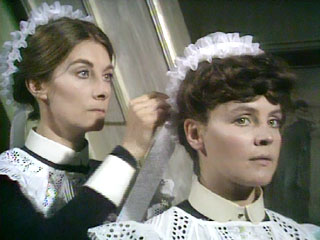
Studio: 21st May 1971 (13/13)
Location: 30th October 1970
Sarah applies for a job as parlourmaid for the Bellamy family. Somewhat intimidated, Sarah meets with the mistress of the house, Lady Marjorie Bellamy. The eldest daughter of the Earl of Southwold, Lady Marjorie is married to Tory MP, Richard Bellamy. Her Ladyship asks the young woman about her previous employment in service and Sarah speaks fancifully about her background. Sarah is engaged, on trial, and meets the downstairs staff – Mr Hudson, who has been butler for the Bellamys since their marriage. Likewise, Mrs Bridges, the celebrated Bellamy cook; Maude Roberts, Lady Marjorie's lady's maid; Emily, the sweet and simple Irish scullery maid; Pearce, the coachman; and Alfred, the eccentric footman. But Sarah will report to Rose Buck, head houseparlourmaid for the Bellamys for many years. The staff are amused by Sarah, who is very colourful and claims she's descended from French nobility. The servants understand, in short order, that Sarah tells tall tales and is not to be taken seriously. Rose explains Sarah's household duties very efficiently and the two women become friends. As Sarah tries to settle in at 165 Eaton Place, Rose discovers that Sarah can't read, and that she's full of mischief. Rose will have to keep an eye on her – she's very protective of her and despite her impishness, Rose can see that Sarah is a "good girl" who needs her guidance. (John Iodice)
Writer: [Alfred Shaughnessy and] Fay Weldon [and Rex Firkin]
Designer: John Clements
Director: Raymond Menmuir [and Derek Bennett]*
Regular cast: Sarah, Hudson, Rose, Mrs Bridges, Lady Marjorie Bellamy, Richard Bellamy, Emily, Roberts, Alfred, Pearce
Guest cast: Patsy Crowther (Matty)+
* The original black-and-white version (see Factfile) was directed by Derek Bennett and was recorded on 13th November 1970. Menmuir's colour version reused Bennett's original film inserts, which had been shot in colour.
+ The black-and-white version (see Factfile) had actress Beatrice Greeke playing Matty.
The Mistress and the Maids
1.2 (2): b/w
UK: 17th October 1971
US: c.autumn 1988 #
Germany: †
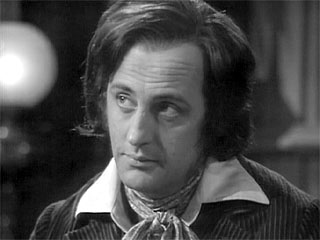
Studio: 27th November 1970 (1/13)
Mr Scone has been enlisted to paint a portrait of Lady Marjorie. One afternoon, Sarah goes around to Scone's studio to bring some of Her Ladyship's garments for his scrutiny. Scone finds Sarah very striking and is inspired to paint her, lying on a bed he has in his garret. Sarah is sceptical, but when he flatters her, she consents but no one must know, she implores. She does tell Rose, who is wary of this bohemian. When the portrait of Lady Marjorie is unveiled at an exhibition of Scone's work, Richard and his wife are shocked to see the suggestive portrait – a semi-nude study of Sarah and Rose preparing for bed – hung beside his formal depiction of Lady Marjorie. Assuming that Scone has been surreptitiously visiting Sarah and Rose's bedroom to paint his picture, Her Ladyship wants Sarah and Rose dismissed immediately. Sarah explains to Lady Marjorie that she has it all wrong – she sat alone for Scone at his studio and he and Rose have never met. After a visit to Scone by Richard, Sarah's story is confirmed and Lady Marjorie relents. (John Iodice)
Writers: [Alfred Shaughnessy and Maureen Duffy]*
Designer: John Clements
Director: Derek Bennett
Regular cast: Lady Marjorie Bellamy, Richard Bellamy, Hudson, Sarah, Rose
Guest cast: Anton Rodgers (Scone)
* This episode – which had a working title of The Model – was largely rewritten by script editor Alfred Shaughnessy, leading Duffy to ask for her name to be removed.
Board Wages
1.3 (3): b/w
UK: 24th October 1971
US: c.autumn 1988 #
Germany: 26th July 1975
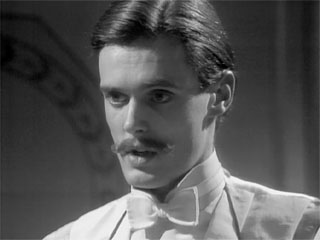
Studio: 11th December 1970 (2/13)
Location: 30th October 1970
The Bellamys are away and the house is empty. One evening, servants from another house in Eaton Place visit and they gossip about their chic employers. Taking it a step further, Rose and Sarah go upstairs and Sarah dons one of Lady Marjorie's gowns. The servants hold a mock drinks party in the morning room, making sport of their betters. When Sarah mockingly summons Hudson, Captain James Bellamy walks in and takes on the role of butler. The servants are mortified, but James persists. He's returned from an evening gone sour and is not in a forgiving mood. A defiant Sarah continues her charade upstairs while removing her gown and speaks very intimately with James. He kisses her passionately and promises not to disclose to his parents what he has come home to this evening. Never entirely satisfied in service and despite Rose's pleas to stay, Sarah leaves the very next day – and from the front door this time. (John Iodice)
Writers: Terence Brady and Charlotte Bingham
Designer: John Clements
Director: Derek Bennett
Regular cast: Sarah, Rose, Alfred, Emily, James
Guest cast: Alethea Charlton (Enid), Peter Sproule (Henry)
This episode had a working title of The Mice Will Play.
The Path of Duty
1.4 (4): b/w
UK: 31st October 1971
US: c.autumn 1988 #
Germany: †
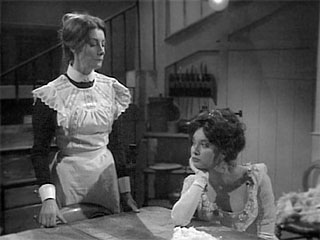
Studio: 1st Jan 1971 (3/13)
Elizabeth Bellamy, who has been studying in Germany, returns to Eaton Place. Lady Marjorie tutors her daughter in how to present herself and hires a celebrated seamstress to attend to Elizabeth's couture, preparing her for the London season. Elizabeth has been invited to a splendid ball and she's to be presented to royalty. Lady Marjorie's cup runneth over and the excitement, throughout the entire household, is in full throttle. When Elizabeth leaves Eaton Place, she looks exquisite and more than suitable for the royals. When she arrives at this glittering affair, Elizabeth looks analytically around her and decides that she wants no part of any of it. She's an intelligent and educated young woman, with ideas and opinions. She abjectly eschews what she perceives is a mindless, superficial lifestyle, where tedious small talk is the order of the day. She leaves the gala and doesn't tell a soul. Her Ladyship and her father are greatly upset, but Rose talks some sense into Elizabeth when she surfaces in the servants' hall. Each have their duties and responsibilities to perform and, Rose tells her, like it or not, Elizabeth must conform in her very best "to the manner born" way for her own sake and to please her parents. (John Iodice)
Writer: John Harrison
Designer: John Clements
Director: Joan Kemp-Welch
Regular cast: Hudson, Mrs Bridges, Rose, Lady Marjorie Bellamy, Elizabeth Bellamy, Richard Bellamy, Alfred, Emily, James Bellamy, Pearce, Roberts
Guest cast: Margaretta Scott (Aunt Kate Castleton), John Quayle (Lieutenant Watson), Elma Soiron (Madame Dubois), Jessica Benton (Lady Cynthia), Christopher Moran (The Errand Boy)
A Suitable Marriage
1.5 (5): b/w
UK: 7th November 1971
US: c.autumn 1988 #
Germany: †
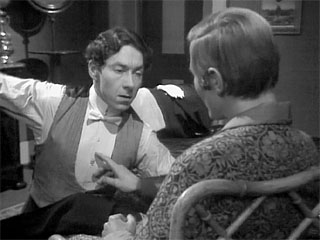
Studio: 15th January 1971 (4/13)
Elizabeth breaks off her engagement with Angus MacAllister – a relationship her parents have been carefully nurturing. However, she encounters an old friend from her days in Dresden, Baron Klaus von Rimmer. As they become better acquainted, Elizabeth finds his tales of his German background and upbringing enchanting. Richard has his suspicions about the Baron's motivations and talks to him frankly – what is it that he's after? He's protective of Elizabeth's feelings and wants Klaus to speak to him plainly. The Baron says he sells arms and would like Richard to use his influence in the admiralty to seal a contract with the British government – a deal that would give the Baron access to classified British naval information. The Baron tries to sweeten the deal by offering Richard a bribe. Richard is no fool and sees the Baron for the spy he is and undertakes to have the Baron arrested at Eaton Place. What Richard doesn't know is that the Baron is in a homosexual relationship with Alfred, the Bellamy footman. When Alfred realizes that Richard is planning to have Klaus arrested at dinner that evening, he puts Klaus on to the plot. Dinner is about to served and Klaus graciously excuses himself. With Alfred at his side, the two leave in a hurry. Alfred will accompany Klaus back to Germany – the latter having no thoughts for Elizabeth and her feelings. (John Iodice)
Writer: Jeremy Paul [and Joan Kemp-Welch]*
Designer: John Clements
Director: Joan Kemp-Welch
Regular cast: Hudson, Lady Marjorie Bellamy, Elizabeth Bellamy, Richard Bellamy, Rose, Alfred, Lady Prudence
Guest cast: Horst Janson (Baron Klaus von Rimmer), James Bree (Sir Adam Blake), Ian Dewar (Angus MacAllister), Gillian Hills (The Salesgirl)
* Some portions of this episode (in particular all the opening scenes showing Elizabeth's abortive engagement to Angus) were written by Kemp-Welch when the episode was found to be under-running in rehearsal. The rest of the episode (which had a working title of The Foreign Gentleman) was based on a outline by Michael J Bird.
A Cry for Help
1.6 (6): b/w
UK: 14th November 1971
US: c.autumn 1988 #
Germany: †
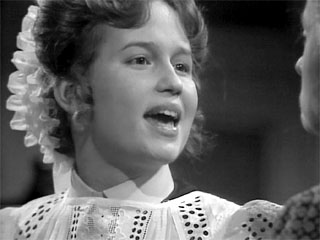
Studio: 29th January 1971 (5/13)
Mary Stokes has been engaged as new under-houseparlourmaid and starts in her post while Lady Marjorie and Rose visit Southwold. Richard comes home one evening and finds the young woman in tears. When pressed, she tells Richard that she is pregnant and that the father is the son of a Belgravia family. Richard talks Mary out of having an abortion and promises to help her by confronting the father, Myles Radford. The staff are bemused that Richard would take such an interest in a lowly houseparlourmaid and there are even whispers that he has sired Mary's child. Myles Radford denies paternity when confronted by Richard and threatens legal action against him if he persists in his quest. Sir Geoffrey Dillon offers wise advice – though he has lofty goals, Richard would be well served to release the girl from her household duties and send her on her way. Richard grudgingly capitulates, but gives Mary a nice sum of money and assures her a good reference. She's very grateful to the kind Mr Bellamy and leaves without a fuss – a sympathetic downstairs wishing her well. (John Iodice)
Writer: Julian Bond
Designer: John Clements
Director: Derek Bennett
Regular cast: Hudson, Mrs Bridges, Richard Bellamy, Roberts, Edward, Emily
Guest cast: Raymond Huntley (Sir Geoffrey Dillon), Susan Penhaligon (Mary), Nicholas Young (Myles Radford)* [Uncredited: Maisie Trent (Waitress), Dennis Plenty, Ann Plenty, Grace Dolan (Customers)]
* TV Times wrongly credits Nicholas Young as playing "Myles Croft".
This episode had a working title of Scandal.
Magic Casements
1.7 (7)
UK: 23rd January 1972
US: c.autumn 1988 #
Germany: 9th August 1975
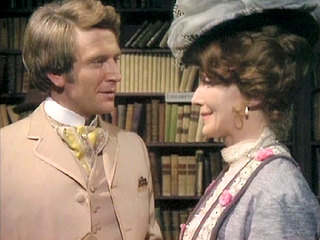
Studio: 12th February 1971 (restaurant, opera & Hudson/Edward scenes rec. 9th Feb) (6/13)
Richard and Lady Marjorie quarrel bitterly when Richard announces his intention to abstain on a vote in the House of Commons. Lady Marjorie reminds her husband that he owes his political career to the patronage of her Tory family and accuses him of extreme disloyalty. On the same day, James presents an army friend, Captain Charles Hammond. Her Ladyship is charmed by this handsome young man of great intelligence and is very impressed with his deep love of the arts, quite uncommon for his age and station in life. He accompanies Lady Marjorie to the opera when Richard is unable to attend, he sends her flowers and, before long, the two are engulfed in an impassioned affair, borne out of a profound love. Richard suspects what's happened and has a talk to his wife. He tells her that he has decided to change his mind and he will vote against the bill, as she wishes. After all, loyalty is far more important and enduring than one's strong whims, he explains. This resonates with Lady Marjorie and she tearfully puts an end to her liaison. Charles returns to India, and sensing his wife's intense sorrow, Richard wisely suggests that she visits Southwold for a few weeks. (John Iodice)
Writer: John Hawkesworth*
Designers: Michael Yates and John Clements
Director: Joan Kemp-Welch
Regular cast: Richard Bellamy, Lady Marjorie Bellamy, Mrs Bridges, Rose, Hudson, Edward, Roberts, James Bellamy
Guest cast: David Kernan (Capt. Charles Hammond), Harold Bennett (the Book Shop Assistant) [Uncredited: Maureen Neill, David Pelton (Young Students), Tom Collister (Professor), Joyce Freeman (Woman in Bookshop), John Demarco (Waiter)]
* The original unused script for this story had been by Owen Holder but was completely rewritten by Hawkesworth.
This episode had a working titles of Lady Marjorie's Lapse and Where Your Loyalty Lies.
I Dies from Love
1.8 (8)
UK: 30th January 1972
US: c.autumn 1988 #
Germany: †
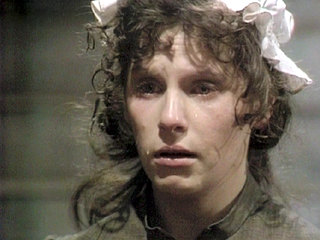
Studio: 26th February 1971 (7/13)
Location: 19th February 1971
Lady Marjorie, Lady Prudence and a new South African member of their circle, Mrs Van Groeben, agree to treat their respective staffs to a day's outing to Hampstead Heath. A picnic in the outdoors will serve them well, in body and spirit and make them more productive. 165's kitchen maid, Emily, is smitten with William, Mrs Van Groeben's young footman. When Emily daydreams about him, Mrs Bridges scolds her with great ferocity. As the couple walk in the park, Emily tells William about her Irish upbringing and that she is quite alone in the world – her family are either dead or have emigrated to America. Mrs Van Groeben persuades William that he can go far in service, but no good will come if he continues his courtship with a lowly kitchen maid. She demands that he break it off with Emily at once. The ambitious William now acts indifferently toward Emily and she surmises what's happened. The prospect of facing a life in service, servile to Mrs Bridges' constant belittlement and with William now abandoning her; she'd rather die. Minutes before they leave for a day that promises to be great fun for all, Rose finds a heartbroken Emily has hanged herself in her room... (John Iodice)
Writers: Terence Brady and Charlotte Bingham
Designer: John Clements
Director: Raymond Menmuir
Regular cast: Mrs Bridges, Rose, Lady Marjorie Bellamy, Hudson, Emily, Edward, Lady Prudence
Guest cast: Aimée Delamain (Lady Templeton), Yolande Turner (Mrs Van Groeben), Charles Lamb (Harris), Tom Marshall (William), Patricia Hamilton (Mrs Fellows), Robin Wentworth (the Policeman), Carl Bernard (Waterman), Christopher Wray (Lowe) [Uncredited: John Cannon, Tony Venner, Brian Nolan, Stephen Ismay, Brian Justice, Barbara Bermel, Jill Goldston, Katrina Swann, Linda Cunningham, Lesley Hand, Wendy Taylor, Pearl Sinclair (Servants on Bus)]
The working title for this story was I Dies of Love. The TV Times originally credited this episode as I Dies for Love (another working title).
Why is Her Door Locked?
1.9 (9)
UK: 6th February 1972
US: c.autumn 1988 #
Germany: 23rd August 1975
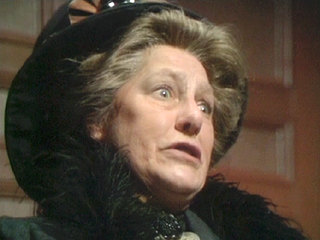
Studio: 12th March 1971 (8/13)
Mrs Bridges is sullen, depressed and guilt ridden in the aftermath of Emily's suicide. When she doesn't appear downstairs one morning, Rose and Hudson knock on her bedroom door, with no response. Her door is locked and Hudson and Rose are worried and suspicious. When she eventually emerges, she's very cagey about how she spent her day off. When she sees Lady Marjorie regarding the day's meals, Her Ladyship senses her depression and tries to comfort her. Hudson gains access to her bedroom and to his astonishment, there's a baby boy on Mrs Bridges' bed. Mrs Bridges confesses that she stole the baby from her pram, on a whim, the night before; Her Ladyship and Richard are notified at once. Calmly, the Bellamys return the child to her parents, Mr and Mrs Webber. Richard tries to diffuse the situation by explaining Mrs Bridges' melancholy and, hoping to avoid the law, subtly offers Webber a bribe. Webber is insulted and insists the police are notified. Mrs Bridges is charged and appears before a magistrate. In a last-minute gesture to help Mrs Bridges and to spare his employers further scandal, Hudson appears in court and manages to clear Mrs Bridges of all charges. Once she settles her mind, Mrs Bridges apologises to all for her behaviour and Lady Marjorie assures her this unfortunate incident is forgotten. (John Iodice)
Writer: Alfred Shaughnessy
Designer: John Clements
Director: Brian Parker
Regular cast: Rose, Hudson, Richard Bellamy, Lady Marjorie Bellamy, Mrs Bridges, Doris, Alice
Guest cast: Michael Guest (The Milkman), Janie Booth (Lily Webber), David Strong (Arthur Webber), John Malcolm (Inspector Cape), Philip Lennard (the Magistrate), Bill Horsley (Perry), John Scott Martin (the Usher) [Uncredited: Charlotte Simmonds (Baby), Ken Helliwell (Uniformed PC), Charles Shaw Hesketh, Jimmy Mac (Magistrates), Bill Gossling (Clerk of the Court), Leonard Kingston (Magistrate's Clerk), Bill Prentice (Solicitor)]
This episode had a working title of Mrs Bridges' Baby.
A Voice from the Past
1.10 (10)
UK: 13th February 1972
US: 13th January 1974
Germany: †
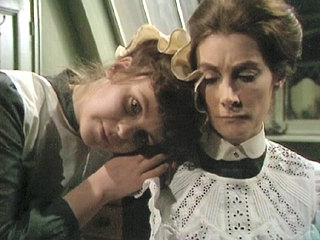
Studio: 26th March 1971 (9/13)
In her indefatigable efforts to help the poor, Elizabeth convinces her brother, James to help her bring clothing and food to the East End of London, where residents live in abject squalor. It's an eye-opening experience for James – he has never encountered such needy people before. Among the crowd, he recognises his parents' former parlourmaid, Sarah. The Bellamy siblings take her back to Eaton Place and Mrs Bridges is shocked at her gaunt, pallid look. Elizabeth offers Sarah the scullery-maid's post in her mother's absence. Though sad to hear of Emily's death, Sarah is as mischievous as ever and claims that she's acquired psychic powers during her time out of service. She gathers the servants together and claims to conjure Emily's ghost. Mrs Bridges cries out and asks Emily's spirit to forgive her. When James hears of the high jinx, he tells Elizabeth that Sarah must leave – she's as disruptive as ever. Her old friend, Rose, defends her and ultimately, Sarah is allowed to stay. Rose scolds her and tells her to mend her ways, but knows Sarah's high spirits cannot be harnessed. (John Iodice)
Writer: Jeremy Paul
Designer: John Clements
Director: Raymond Menmuir
Regular cast: Rose, Mrs Bridges, Hudson, Elizabeth Bellamy, Sarah, Alice, Edward, Doris, James Bellamy, Henrietta Winchmore
Guest cast: Martin Gordon (the Beggar), Winifred Sabine (the Beggarwoman/Mrs Ashe), Amanda Walker (Mrs Pinkerton)
The Swedish Tiger
1.11 (11)
UK: 20th February 1972
US: c.autumn 1988 #
Germany: †
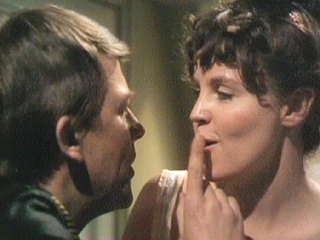
Studio: 8th April 1971 (10/13)
Elizabeth returns to London from Scotland. Lady Marjorie has asked her to check on Sarah and how she is faring in her duties. She discovers that James has a visiting house guest, a Swedish friend and a member of his regiment, Captain Axel Ryttsen. Ryttsen has brought Kraft, his valet, with him. Kraft has been removing valuable objects from the Bellamy house on behalf of his master and using them to raise money to pay off gambling debts. In a byzantine scheme, Ryttsen and Kraft use Sarah as a patsy, with the sweet-talking Kraft promising Sarah that she will return to Sweden with him. After implicating Sarah in the disappearances of the valuables, the conniving Ryttsen and Kraft speed back to Stockholm with the largess of their scheming and leave Sarah behind to face the music – one hapless servant girl who will certainly be dismissed. (John Iodice)
Writer: Raymond Bowers
Designer: Barbara Bates
Director: Brian Parker
Regular cast: Sarah, Elizabeth Bellamy, James Bellamy, Edward
Guest cast: Sven-Bertil Taube (Thorkil Kraft), Peter Clay (the Jeweller), Geoffrey Whitehead (Captain Aksel Ryttsen), Gillian Lind (Flossie), Dorothy Black (Flo), Veronica Lang (the Jeweller's Wife), Colin Rix (the Policeman), Rex Robinson (Inspector Hurst), Doel Luscombe (the Art Dealer) [Uncredited: John Slavid (Card Player)]
This episode had a working title of The Danish Tiger.
The Key of the Door
1.12 (12)
UK: 27th February 1972
US: c.autumn 1988 #
Germany: †
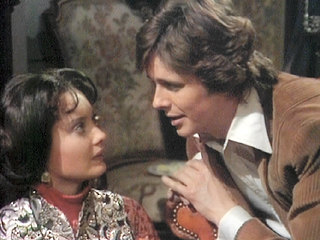
Studio: 23rd April 1971 (11/13)
Elizabeth has made new friends in Bloomsbury – outré artists, intellectuals and a rather handsome poet named Lawrence Kirbridge, to whom Elizabeth is drawn. Lady Marjorie and Richard leave London for the weekend and Elizabeth invites this motley group to Eaton Place. Lawrence reads his poetry in the morning room and tea is served. Rose and Hudson are disgusted and shocked by their slovenly and ill-mannered ways and Edward comments on their lack of hygiene. When Elizabeth's parents return and find the doyenne of the group dancing on a table, they are speechless and Lady Marjorie asks them to leave immediately. Elizabeth is mortified and harsh words are exchanged. Richard urges his daughter to consider her behaviour and their feelings and those of the servants as well. The following day, Elizabeth's new friends involve her in a scheme to "liberate" boots from a shop and give them to the poor, for which she is arrested. Her livid parents threaten to send her to Southwold, the family estate, but Elizabeth runs off in anger. She heads straight to the lodgings of some of her friends in Bloomsbury and asks if she can stay with them, but is turned away. The truth is that this cadre of non-conformists view Elizabeth with disdain – she's a rich girl who cannot be taken seriously. There's little for Elizabeth to celebrate on her special day – she's been rejected by her bohemian chums and has alienated herself utterly from a bewildered Richard and a very perturbed and distressed Lady Marjorie. (John Iodice)
Writers: John Hawkesworth and Alfred Shaughnessy [and Fay Weldon]*
Designer: John Clements
Director: Raymond Menmuir
Regular cast: Rose, Elizabeth Bellamy, Mrs Bridges, Hudson, Lady Marjorie Bellamy, Richard Bellamy, Edward, Doris, Lawrence Kirbridge, Henrietta Winchmore
Guest cast: Georgia Brown (Evelyn Larkin), Tutte Lemkow (Gustave), Tom Owen (Stanley), Jon Delmar (the Guitarist), Pat Nye (Perdita), John Rapley (Mr Summers) [Uncredited: Katie Evans, Lewis Barber, June Turner, Edith Gey (Extras)]
* Fay Weldon wrote the original script for this episode which was then partly rewritten by producer Hawkesworth and script editor Shaughnessy. Weldon asked for her name to be removed.
For Love of Love
1.13 (13)
UK: 5th March 1972
US: 20th January 1974
Germany: 6th September 1975
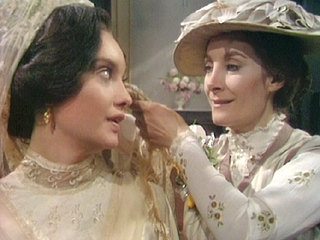
Studio: 7th May 1971 (one scene rec. 4th May) (12/13)
Location: 28th April 1971
Anger at Elizabeth has turned into worry – neither Lady Marjorie nor Richard know where she is. Rose knows, however, and she visits Elizabeth to bring some items she's left behind. Elizabeth is staying with her activist friend, Henrietta and they have frequent visits from Lawrence Kirbridge. Elizabeth and Lawrence have fallen in love, but Rose conveys her parents' concern and urges her to return home. James Bellamy has something to hide from his parents as well. He's been seeing Sarah, who has become the toast of the Camden Town music hall since she was dismissed from service. Elizabeth relents, returns home and introduces Lawrence to her parents. Richard and Her Ladyship find him charming and quite presentable. Lawrence persuades Elizabeth that they should marry and she capitulates to please him. Mindful that she has been given her parents more than their share of grief, she agrees to a conventional church wedding and all of its trappings. On the eve of her wedding, she assures her mother that she is still "pure" and loves Lawrence utterly. Her wedding day arrives and a beaming Richard is very pleased with his beautiful and beloved daughter. The servants are in church and are shocked to see Sarah walk down the main aisle and seat herself as a guest of James. After a glittering reception for the newlyweds at Eaton Place, the handsome couple leave for their honeymoon and James and Sarah make plans of their own. (John Iodice)
Writer: Rosemary Anne Sisson
Designer: John Clements
Director: Herbert Wise
Regular cast: Rose, Hudson, Lady Marjorie Bellamy, Richard Bellamy, Elizabeth Bellamy, Lawrence Kirbridge, Sarah, James Bellamy, Henrietta Winchmore, Pearce, Edward, Lady Prudence
Guest cast: Sylvia Brayshay (Nelly) [Uncredited: Leslie Nye (Extra)]